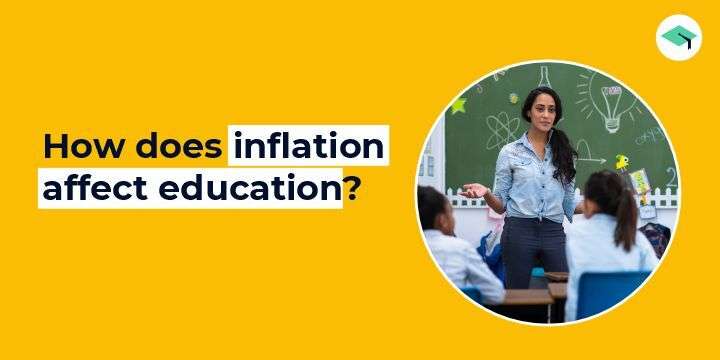Understanding the Phenomenon of Education Inflation

Education inflation, just like rising prices in daily life, is quietly reshaping our future. Education inflation talks about the rise of education costs like tuition fees as well as secondary costs like transport, books, accommodation, and living expenses. The overall cost of attendance for any school or college has drastically increased by 10% over the years.
It’s a financial challenge we can’t afford to ignore. Let’s go through this article and get to know about education inflation in-depth, how it affects Indian parents and how can you deal with it.
Education Inflation: What is it?
Education inflation refers to the steady and consistent increase in the cost of education over time. Like general inflation, where the prices of goods and services rise, education inflation specifically pertains to rising expenses related to schooling, college, and educational services.
This includes tuition fees, textbooks, school supplies, and other educational expenses. Education inflation can put a strain on students and their families, making it increasingly challenging to afford a quality education.
Understanding Education Inflation with Examples
Education inflation is when the cost of going to school or college keeps going up over time. It’s like when the price of your favorite snacks or toys increases, but in this case, it’s about the price of education.
Here, we’ll explore why school and college fees are getting more expensive and why this trend is likely to continue.
Examples of Increasing Fees
1. School Tuition Fees
In India, school tuition fees have been steadily rising due to education inflation. Private schools have seen significant fee hikes. For instance, a prominent private school in Mumbai raised its annual tuition fee from INR 1 lakh to INR 1.5 lakh within just a few years.
2. College Tuition Fees
College fees have also been affected. Many Indian universities have increased their fees to cope with rising costs. A prominent engineering college in Delhi raised its annual tuition fee for undergraduate programs from INR 50,000 to INR 80,000 in just three years.
The Future of Rising Fees
As education inflation continues, it’s likely that school and college fees will continue to increase. The demand for quality education remains high, and institutions must invest in resources to meet these demands.
Moreover, with the ongoing impact of inflation on the economy, institutions may need to raise fees to maintain their financial stability.

Why Education Inflation is Rising?
Why Education inflation will continue?
Education inflation is likely to persist for several reasons:
1. Growing Population: As India’s population continues to rise, more students will seek admission to schools and colleges, increasing demand.
2. Advancements in Learning Tools: As technology keeps evolving, schools and colleges will need to invest in newer tools and resources to stay competitive, which can lead to higher fees.
3. Economic Pressures: With the ever-changing economic landscape, schools and colleges might raise fees to cope with inflation and maintain quality.

Impact of Education Inflation
Factors driving Education Inflation
There are a lot of factors which are responsible for the education inflation rate in India:
1. Increased Demand for Education: As more and more people want to get an education, like going to college or sending their kids to school, the demand goes up. This means colleges and schools can charge higher fees because they know many people are willing to pay for it.
2. Economic Inflation: General inflation in the economy makes everything more expensive, including education. When the prices of goods and services rise, schools and colleges often adjust their fees to keep up with the higher cost of living
Addressing Education Inflation with EduFund’s Products
Education inflation is a growing concern, and finding ways to manage the rising costs of education is crucial. EduFund offers a range of products and services designed to help students and families address this challenge effectively.
Here’s how EduFund’s products can contribute to tackling education inflation:
1. EduFund Savings Plans: EduFund provides savings plans tailored to educational goals. These plans allow families to set aside money specifically for education expenses, helping to mitigate the financial burden of rising tuition fees. By starting early and saving consistently, families can accumulate funds to cover future educational costs.
2. Scholarship and Financial Aid Services: EduFund offers guidance and support in finding scholarships and financial aid opportunities. Scholarships can significantly reduce the overall cost of education, making it more affordable for students. EduFund helps students identify and apply for scholarships that match their qualifications and interests.
3. Education Loan Assistance: For students who require loans to finance their education, EduFund offers assistance in navigating the loan application process. They can provide information on different loan options, interest rates, and repayment plans, helping students make informed decisions about borrowing.
4. Investment Strategies: EduFund provides investment advice and strategies to help families grow their educational savings over time. Through careful investment planning, families can potentially earn returns that outpace the rate of education inflation, ensuring their savings keep up with rising costs.
5. Financial Planning Workshops: EduFund conducts workshops and educational sessions on financial planning for education. These workshops equip students and parents with the knowledge and tools to make sound financial decisions, manage education expenses, and avoid unnecessary debt.
6. Personalized Education Funding Solutions: EduFund understands that every student’s situation is unique. They offer personalized solutions that take into account a student’s academic goals, financial circumstances, and aspirations. This tailored approach ensures that families can address education inflation effectively while meeting their individual needs.
Conclusion
Education inflation is a pressing issue that demands our attention. To combat this challenge, consider proactive steps like saving and investing wisely.
One such solution is EduFund, which helps you secure your educational future. Start planning today to ensure that quality education remains accessible for generations to come.
FAQs
What is education inflation?
Education inflation refers to the steady increase in the cost of education over time, similar to how the prices of everyday goods and services rise. This includes tuition fees, textbooks, school supplies, and other educational expenses.
How does education inflation affect Indian parents?
Rising education costs strain families, making it increasingly challenging to afford quality education for their children. This can lead to financial stress and limit educational opportunities for some students.
What are the reasons behind the rising cost of education?
Several factors contribute to education inflation, including:
- Growing demand for education: As more people prioritize education, institutions can charge higher fees due to increased demand.
- Economic inflation: General economic inflation impacts everything, including education. Schools and colleges adjust fees to keep up with the rising cost of living.
- Advancements in learning tools: Evolving technology necessitates schools and colleges to invest in new tools and resources, leading to potentially higher fees.
recommended reading
10 Benefits of Studying in Canada!
10 Reasons Why You Should Study in the USA
11 reasons to study in Australia
4 essential tips on investing in your child's education
4 Reasons why you should have an EduFund
5 Reasons why Global Education is the Best for Indian Students
5 reasons why your child's college education is at stake
5 steps to apply for art school admission
5 ways to deal with rising college fees for your child!














